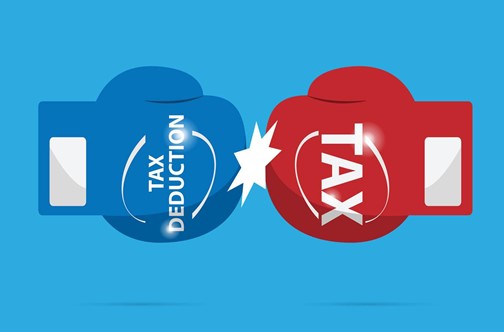8 Ways to Maximize Your Tax Deductions
Tax deductions are expenses that can be subtracted from your taxable income, meaning the overall amount you are taxed on by the Internal Revenue Service (IRS) is lower. This is a great way to maximize your savings and boost your tax refund. After all, who doesn't love a tax cut?

There are two key ways to claim tax deductions — either by taking a flat standard deduction from your adjusted gross income or by conducting itemized deductions, one by one. You can choose one of the two methods, but not both, meaning you should calculate which of the options grants you the greatest tax deduction. This can be different year to year, so it's important to evaluate which of the two will be the better deal for you each time you file taxes.
There are various circumstances for which you can claim tax deductions, from business operations to mortgages to charitable giving and more. In order to make it easier to understand, we've broken up different tax deduction opportunities into the following categories:

-
Home ownership/mortgage — If you're a homeowner choosing to itemize your deductions on Schedule A, you can claim a tax deduction for the interest paid on your mortgage. In order to be eligible, the interest paid must be from a loan on a first or second mortgage, or a home improvement loan, which is secured on your main or second home.
Additionally, the loan must have been used to buy, build, or sustainably improve your home. The deduction for home acquisition debt taken out after December 15, 2017 is limited to $750,000 (or $375,000 if you are married but filing separately), and $1 million ($500,000 if you are married but filing separately) for home acquisition indebtedness that was incurred prior to December 16, 2017.
- Business and organizational costs

New Business Ventures:
If you're a new business owner, you should know that the expenses incurred before your business was in action are not considered to be current deductions. As a general rule, start-up costs must be amortized over 180 months, including the month in which the business began. However, the good news is that you can choose to deduct up to $5,000 of both business start-up and organizational costs incurred. This deduction is reduced by any start-up or organizational costs that are greater than $50,000.
Hobbies:
Even if you are pursuing something you are passionate about, if your main priority is not to make a profit from it, there are limited deductions you can take. You must include your return income for ventures that were not expected to make a profit. For example, if you have an activity that you take part in that is mostly for recreation or pleasure, you will not be able to use any losses or liabilities from that activity to offset other income. This applies to individuals, partnerships, estates, trusts, and S corporations.
What if I'm self-employed?:
If you're self-employed, you can claim tax deductions on business expenses that are both ordinary, meaning it's common within your trade or business and necessary, meaning it's helpful and appropriate for your trade or business. Unless considered indispensable, the expense will not be tax deductible.
- Vehicles —There are several circumstances in which vehicles are eligible to be claimed as tax deductions.

Donated Vehicles:
In some cases, taxpayers can apply for a tax deduction for donating cars to charities, as it may fall under the category of charitable contributions. If the value of the donated vehicle is greater than $500, you can deduct the smaller of the vehicle's FMV on the day of contribution or proceeds received from the sale. Before applying for a tax deduction for a donated vehicle on a tax return, make sure that the organization you contribute your vehicle to is eligible or qualified. Resources like the Tax Exempt Organization Search can verify eligibility.
Electric/plug-in vehicles:
If you've purchased an electric vehicle which draws from a battery of at least 5 kwh of capacity, you are eligible for a tax credit of $417, plus an additional $417/kwh of battery capacity exceeding 5 kwh. The total tax credit amount allowed for an electric vehicle is $7,500, and can only be applied to the original buyer of the qualifying vehicle. Additionally, the vehicle must be primarily used in the United States of America and placed in service within the same year that the tax credit is being claimed on a tax return.
- Charitable contributions — Expenses that went towards charitable causes are often tax deductible. Therefore, if you have donated to a charity fundraiser or event, or to charitable causes like supporting relief teams or religious efforts, that money can be considered deductible. Be sure to keep track of your receipts in the event that you are audited for your charitable giving.
-
Sales taxes — Similar to that of choosing between a standard and itemized deduction, there are two options to choose from when it comes to considering sales tax deductions: state income taxes or sales taxes. It's important to assess your financial activity and circumstance to determine whether the sales tax break will be larger than a state income tax deduction, especially if you made large purchases.

- Educational — Certain student loans and educational opportunities can be considered deductible, depending on the situation and your filing status. However, if you meet the criteria, this could be a great way to reduce your tax bill for the years spent furthering your education.
- Health insurance premiums — In order to apply for a tax deduction on health insurance premiums, your medical expenses must be greater than 7.5% of your adjusted gross income in order to be eligible. However, self-employed individuals who manage their own health insurance coverage may be qualified to deduct all or most of their premium costs.
- Tax credit for child/dependent care — Tax credits reduce your tax bill dollar for dollar, and are often preferred over tax deductions. In 2021, the American Rescue Plan brought new changes to the stipulations that child and dependent tax credit can be claimed. Make sure to refer to IRS conditions to see where you fit into the equation.
So there you have it: 8 different categories of tax deductible options to make the most of your tax savings. Need help with tax planning and preparation, or maximizing your deductions for your business or startup? Contact us for expertise from seasoned financial professionals for all your tax needs and inquiries.

